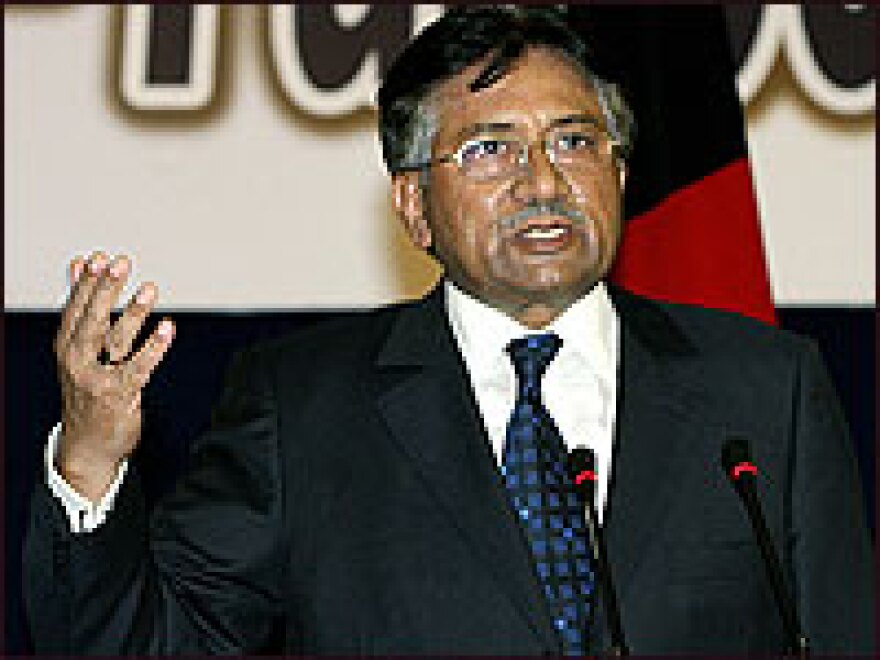Pakistan's Election Commission appears to have cleared the way for President Gen. Pervez Musharraf to seek another term while serving as army chief, even as legal challenges mount.
The commission announced a rule change Monday to a key article of the constitution that would allow Musharraf to seek reelection to the presidenc while continuing to hold his post as army chief.
That article includes a prohibition against government servants running for election that some legal experts argue prevents Musharraf, who heads the army, from seeking another term. It also specifies that former government servants must wait for two years before they become eligible to run. Some argue that makes Musharraf ineligible even if he quits as army chief.
The commission said it was updating its rules to reflect Supreme Court rulings in 2002 and 2005 that Article 63 of the constitution did not apply to Musharraf.
"The chief election commissioner of Pakistan has made the requisite amendment, with the approval of the president," the commission said in a statement.
Several court challenges could render the Election Commission's actions moot.
On Monday, the Supreme Court resumed hearing six petitions, including one by Jamaat-e-Islami, Pakistan's largest Islamist group, on Musharraf's eligibility to stand again. The court's decision could override the actions of the Election Commission.
Attorney General Malik Mohammed Qayyum said that, with the cases pending in court, the Election Commission was reluctant to announce the schedule for the presidential election. Ruling party lawmakers have said it will be held in early October.
Meanwhile, the Election Commission's rule change drew an outraged response from opposition leader and former Prime Minister Benazir Bhutto. She also accused Musharraf's allies of leading the country toward a dangerous crisis by refusing to restore democracy and share power.
Bhutto has been in talks with Musharraf on a pact including constitutional amendments to defuse the legal challenges to his re-election and let her return and seek a third term as premier in parliamentary elections due by January.
Monday's announcement by the election commission, however, seemed to remove the need for such a pact.
Bhutto predicted the decision would enrage the same lawyers who led the campaign for the restoration of Pakistan's independent-minded top judge whom Musharraf tried to remove from office in March, sparking a pro-democracy protest movement. The Supreme Court later reinstated the judge.
"All political parties, irrespective of whether they were moderates or religious, regional or national, came together to back the lawyers and their movement and I think the same would happen
again," Bhutto told The Associated Press late Sunday, when Pakistani media first reported the rule change.
She said her party may join other opposition groups in resigning from parliament. She said that for Musharraf to seek re-election in uniform would be "illegal."
Pakistan's political turmoil is deepening as Musharraf, who took power in a 1999 coup, tries to extend his rule. He wants lawmakers to vote him back in by mid-October, but faces tough legal and political obstacles.
Musharraf's term expires Nov. 15. The president, who became a key U.S. ally after the Sept. 11, 2001, attacks, is elected in a vote by all members of Pakistan's provincial and national assemblies.
Musharraf's standing has plummeted since March, and he is also struggling to contain a surge in attacks by pro-Taliban militants near the border with Afghanistan.
Last week, he sidelined his chief political rival, former Prime Minister Nawaz Sharif, sending him back into exile. But in doing that, he set up another showdown with the Supreme Court that had earlier ruled that Sharif could return to Pakistan.
Information Minister Muhammad Ali Durrani said the government was not involved in the rule change. He defended the Election Commission's announcement, saying it had only amended the election rules in accordance with court rulings.
From NPR reports and The Associated Press
Copyright 2023 NPR. To see more, visit https://www.npr.org.



